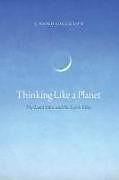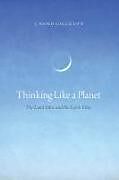Thinking Like a Planet
Einband:
Kartonierter Einband
EAN:
9780199324897
Untertitel:
The Land Ethic and the Earth Ethic
Autor:
J. Baird Callicott
Herausgeber:
Oxford University Press
Anzahl Seiten:
394
Erscheinungsdatum:
01.02.2014
ISBN:
0199324891
abundantly stimulating and vital contribution to Leopold scholarship, climate ethics and environmental philosophy...
Autorentext
J. Baird Callicott is University Distinguished Research Professor at the University of North Texas. He is co-Editor-in-Chief of the Encyclopedia of Environmental Ethics and Philosophy and author or editor of a score of books and author of dozens of journal articles, encyclopedia articles, and book chapters. His research goes forward on three main fronts: theoretical environmental ethics, comparative environmental philosophy, philosophy of ecology and conservation biology. He taught the world's first course in environmental ethics in 1971 at the University of Wisconsin-Stevens Point.
Klappentext
Bringing together ecology, evolutionary moral psychology, and environmental ethics, J. Baird Callicott counters the narrative of blame and despair that prevails in contemporary discussions of climate ethics and offers a fresh, more optimistic approach.
Inhalt
Introduction
PART 1: THE LAND ETHIC
1. A Sand County Almanac
1.1 The Author
1.2 The Provenance of the Book
1.3 The Unity of A Sand County Almanac-An Evolutionary-Ecological Worldview
1.4 The Argument of the Foreword-Toward Worldview Remediation
1.5 The Argument in Part I-The Inter-subjective Biotic Community-Introduced
1.6 The Argument of Part I-The Inter-subjective Biotic Community-Driven Home
1.7 The Argument in Part II-The Evolutionary Aspect: Time and Telos
1.8 The Argument in Part II-The Evolutionary Aspect: Beauty, Kinship, and Spirituality
1.9 The Argument of Part II-The Ecological Aspect
1.10 The Argument of Part II-The Pivotal Trope: "Thinking Like a Mountain"
1.11 Norton's Narrow Interpretation of Leopold's Worldview-remediation Project
1.12 The Argument of Part III-To "See" with the Ecologist's "Mental Eye"
1.13 The Argument of Part III-Axiological Implications of the Evolutionary-Ecological Worldview
1.14 The Argument of Part III-The Normative Implications of the Evolutionary-Ecological Worldview
1.15 The Persuasive Power of Leopold's Style of Writing
1.16 The New Shifting Paradigm in Ecology and the Evolutionary-Ecological Worldview
1.17 The Challenge Before Us
2. The Land Ethic: A Critical Account of Its Philosophical and Evolutionary Foundations
2.1 The Odysseus Vignette
2.2 Expansion of the Scope of Ethics Over Time (?)
2.3 Ethical Criteria/Norms/Ideals versus (un)Ethical Behavior/Practice
2.4 Ethics Ecologically (Biologically) Speaking
2.5 Darwin's Account of the Origin of Ethics by Natural Selection
2.6 Darwin's Account of the Extension of Ethics
2.7 The Community Concept in Ecology
2.8 The Humean Foundations of Darwin's Evolutionary Account of the Moral Sense
2.9 Universalism and Relativism: Hume and Darwin
2.10 How Hume Anticipates Darwin's Account of the Origin and Expansion of Ethics
2.11 Shades of the Social-Contract Theory of Ethics in "The Land Ethic"
2.12 Individualism in (Benthamic) Utilitarianism and (Kantian) Deontology
2.13 Holism in Hume's Moral Philosophy
2.14 Holism in "The Land Ethic"
2.15 The Land Ethic and the Problem of Ecofascism Resolved
2.16 Prioritizing Cross-community Duties and Obligations
2.17 Is The Land Ethic Anthropocentric or Non-anthropocentric?
3. The Land Ethic (an Ought): A Critical Account of Its Ecological Foundations (an Is)
3.1 Moore's Naturalistic Fallacy
3.2 Hume's Is/Ought Dichotomy and the Land Ethic
3.3 How Hume Bridges the Lacuna Between Is-statements and Ought-statements
3.4 How Kant Infers Ought-statements from Is-statements in Hypothetical Imperatives
3.5 The Specter of Hume's Is/Ought Dichotomy Finally Exorcised
3.6 The Roles of Reason and Feeling in Hume's Ethical Theory Generally and Leopold's Land Ethic Particularly
3.7 How the General Theory of Evolution Informs the Land Ethic
3.8 How Ecosystem Ecology Informs the Land Ethic-Beyond the Biota
3.9 How Ecosystem Ecology Informs the Land Ethic-A Fountain of Energy
3.10 How Organismic Ecology Informs the Land Ethic
3.11 How Mechanistic Ecology Informs the Land Ethic
3.12 How the Ecosystem Paradigm Returns Ecology to Its Organismic Roots
3.13 How Leopold Anticipates Hierarchy Theory in "The Land Ethic"
3.14 Ecological Ontology and the Community Paradigm in Ecology
3.15 Ecological Ontology and the Ecosystem Paradigm in Ecology
3.16 The "Flux of Nature" Paradigm Shift in Contemporary Ecology and "The Land Ethic"
3.17 A Revised Summary Moral Maxim for the Land Ethic
4. The Land Ethic and the Science of Ethics: From the Seventeenth through the Twentieth Centuries
4.1 Hobbes's Science of Ethics
4.2 Locke's Science of Ethics
4.3 Hume's Science of Ethics
4.4 Kant's Science of Ethics
4.5 The Utilitarian Science of Ethics
4.6 How Logical Positivism Cleaved Apart Science and Ethics
4.7 Ayer's Migration of a Science of Ethics from Philosophy to the Social Sciences
4.8 Kohlberg's Social Science of Ethics
4.9 Gilligan's Social Science of Ethics
4.10 Group Selection in Darwin's Science of Ethics
4.11 Group Selection in Wynne-Edwards's Evolutionary Biology
4.12 Williams's Attack on Group Selection
4.13 Huxley's and Williams's Anti-natural (and Anti-logical) View of Ethics
4.14 Sociobiology: Wilson's Neo-Darwinian Account of the Origin of Ethics
4.15 The Fallacies of Division and Composition in the Sociobiological Science of Ethics
4.16 Sociobiology and Biological Determinism
4.17 The Evolutionary Foundations of the Land Ethic in Light of the Modern and the New Syntheses in Evolutionary Biology
5. The Land Ethic and the Science of Ethics: In the Light of Evolutionary Moral Psychology
5.1 Singer's Response to the Evolutionary Account of Ethics
5.2 Rachels' Response to the Evolutionary Account of Ethics
5.3 Darwin's Alternative to Animal Ethics à la Singer and Rachels
5.4 Midgley's Alternative to Animal Ethics à la Singer and Rachels
5.5 A Community-based Analysis of Ethical Partiality
5.6 A Community-based Analysis of Ethical Impartiality
5.7 Dennett, Singer, Arnhart, and Haidt on the Philosophical Implications of Darwinism
5.8 Group Selection Revisited
5.9 The Analogy between Language and Ethics
5.10 Hume on Nature and Nurture in Ethics
5.11 Post-Positivist Ethical Absolutism
5.12 Wherefore Post-Positivist Ethical Rationalism and Exclusionism
5.13 Moral Norms in Humean Ethics Analogous to Medical Norms
5.14 Critically Appraising Moral Norms in Terms of Intra-social Functionality and Inter-social Harmony
5.15 A Humean-Darwinian Science of Ethics and Constrained Cultural Relativism
5.16 The Philosophical Foundations of the Land Ethic Vindicated by the Contemporary Science of Ethics, but Limited to Ecological Spatial and Temporal Scales

Leider konnten wir für diesen Artikel keine Preise ermitteln ...
billigbuch.ch sucht jetzt für Sie die besten Angebote ...
Die aktuellen Verkaufspreise von 6 Onlineshops werden in Realtime abgefragt.
Sie können das gewünschte Produkt anschliessend direkt beim Anbieter Ihrer Wahl bestellen.
Loading...
Die aktuellen Verkaufspreise von 6 Onlineshops werden in Realtime abgefragt.
Sie können das gewünschte Produkt anschliessend direkt beim Anbieter Ihrer Wahl bestellen.
| # | Onlineshop | Preis CHF | Versand CHF | Total CHF | ||
|---|---|---|---|---|---|---|
| 1 | Seller | 0.00 | 0.00 | 0.00 |
